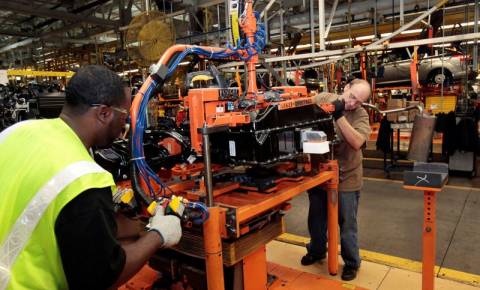WASHINGTON(Reuters) - U.S. manufacturing activity slowed less than expected in July and there were signs that supply constraints are easing, with a gauge of prices paid for inputs by factories falling to a two-year low, suggesting inflation has probably peaked.

The Institute for Supply Management (ISM) said on Monday that its index of national factory activity dipped to 52.8 last month, the lowest reading since June 2020, when the sector was pulling out of a COVID-19 induced slump. The ISM PMI index was at 53.0 in June. A reading above 50 indicates expansion in manufacturing, which accounts for 11.9% of the U.S. economy. Economists polled by Reuters had forecast the index falling to 52.0.
The cooling reflects a shift in spending back to services from goods and rising interest rates as the Federal Reserve tackles stubbornly high inflation. The U.S. central bank last week raised its policy rate by another three-quarters of a percentage point. It has now hiked that rate by 225 basis points since March.
The ISM survey's forward-looking new orders sub-index dropped to 48.0 last month from a reading of 49.2 in June. It was the second straight monthly contraction. Combined with a steady reduction in order backlogs, that suggests a further slowdown in manufacturing in the months ahead.
Still, the continued growth in manufacturing supports economists' views that the economy was not in recession, despite gross domestic product contracting 1.3% in the first half of the year. Wild swings in inventories and the trade deficit tied to snarled global supply chains have been largely to blame, though overall momentum has cooled.
Supply bottlenecks appear to be easing. The ISM's measure of supplier deliveries dropped to 55.2 from 57.3 in June. A reading above 50% indicates slower deliveries to factories.
The improvement helped to curb inflation at the factory gate last month. A measure of prices paid by manufacturers plunged to 60.0. That was the lowest level since August 2020 and was down from 78.5 in June. But the road to low inflation will be long.
While the survey's measure of factory employment rose to 49.9, it remained in contraction territory for a third straight month. Technology companies like Tesla have been laying off workers, but many manufacturers as recently as in June expressed difficulty finding workers.
There were 11.3 million unfilled jobs across the economy at the end of May, with nearly two job openings for every unemployed worker.
(Reporting by Lucia Mutikani; Editing by Chizu Nomiyama)
